 MyDogBreeds
MyDogBreeds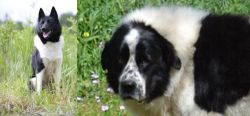 Russo-European Laika is originated from Russia but Greek Sheepdog is originated from Greece. Russo-European Laika may grow 15 cm / 5 inches shorter than Greek Sheepdog. Russo-European Laika may weigh 27 kg / 59 pounds lesser than Greek Sheepdog. Both Russo-European Laika and Greek Sheepdog has same life span. Both Russo-European Laika and Greek Sheepdog has same litter size. Russo-European Laika requires Low maintenance. But Greek Sheepdog requires Moderate maintenance
Russo-European Laika is originated from Russia but Greek Sheepdog is originated from Greece. Russo-European Laika may grow 15 cm / 5 inches shorter than Greek Sheepdog. Russo-European Laika may weigh 27 kg / 59 pounds lesser than Greek Sheepdog. Both Russo-European Laika and Greek Sheepdog has same life span. Both Russo-European Laika and Greek Sheepdog has same litter size. Russo-European Laika requires Low maintenance. But Greek Sheepdog requires Moderate maintenance
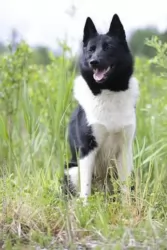 The Russo-European Laika is a hunting dog that comes from Russia.
The Russo-European Laika is a hunting dog that comes from Russia.
It is a dog that has been developed from Spitz type dogs. A breeding program was started for the dog in 1944.
The Russo-European Laika dog is recognized by the Federation Cynologique Internationale in the Spitz and Primitive type group.
 Known as the Olympus Dog or even simply as the Greek Shepherd, the Greek Sheepdog is a large to giant molosser dog from Greece. His purpose has always been to guard flocks and livestock from predators and he has been around for hundreds of years, looking much like the Great Pyrenees.
Known as the Olympus Dog or even simply as the Greek Shepherd, the Greek Sheepdog is a large to giant molosser dog from Greece. His purpose has always been to guard flocks and livestock from predators and he has been around for hundreds of years, looking much like the Great Pyrenees.
It is believed that the dog was likely bred with a number of breeds – both local and non-local dogs.
Unfortunately there were no records kept of the development of the breed but today the Greek Sheepdog remains a rare and fairly unknown breed outside of Greece.
It's numbers are dwindling in Greece too and since 1998 the Greek ARCTUROS has made attempts to save the breed, starting the Greek Shepherd Dog Breeding Program.
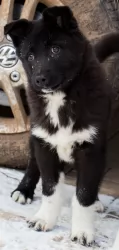 The Russo-European Laika is a medium sized dog Spitz dog that stands at between 54 to 60cm in height and weighs in the region of 20 – 23kg.
The Russo-European Laika is a medium sized dog Spitz dog that stands at between 54 to 60cm in height and weighs in the region of 20 – 23kg.
The dog has quite a strong resemblance to the Karelia Bear Dog. They are sometimes mistaken for each other.
The Russo-European Laika has the typical triangular shaped head with small dark eyes, a black nose and erect, pointed ears. These are deep chested dogs.
As with other Spitz breeds, this dog has a thick fur with a densely furred tail which is curved over the back. The double coat is fairly long and usually a dark grey color or black with some white markings. Sometimes the dog has a white coat.
This is a lively, energetic dog breed that loves to spend time outdoors. It has always been used to alert hunters to prey, using its bark to alert the hunter.Training and socialization will be necessary for the dog if you don’t want it to be barking in the house too.
He makes an excellent guard dog, protecting his human family. It is very tolerant of children too, getting on well with them as well as other pets.
The dog is known for being totally devoted to its family, being an affectionate and loyal breed that doubles as a family pet and guard dog.
 The Greek Sheepdog is a large dog, standing at 65 – 75cm and weighing roughly between 32 to 50kg. He is a dog that displays physical strength. He has a large head with brown eyes and a serious expression on his face. He has a thick double coat which is essentially white with red, black or brown markings.
The Greek Sheepdog is a large dog, standing at 65 – 75cm and weighing roughly between 32 to 50kg. He is a dog that displays physical strength. He has a large head with brown eyes and a serious expression on his face. He has a thick double coat which is essentially white with red, black or brown markings.
You will also see tri-color dogs. He has floppy ears today but there was a time when the right ear of the male dog was cut off or cropped. The tail is long and bushy and it can be held low but also held up so that it curls over the back.
Maybe because of his size and him being a strong-willed, independent thinker, the Greek Shepherd may not be the best choice for a first time dog owner. Having said that, if you're a strong, firm, patient, kind person, then you'll be able to raise any kind of dog, first time or not.
The Greek Shepherd is a brave, loyal, calm, protective dog and with socialization and training, can make an awesome pet. They are dogs who are a bit suspicious with strangers, not making friends too easily. He loves his human family and wants to be part of their activities. He can't be left on his own day after day as this can lead to excessive barking and destructive behavior.
They've been dogs used to working with livestock and they will certainly need to be taken on daily walks and involved in rough and tumble games as they thrive on activity. The dog won't fit easily into city life where there is just a handkerchief-sized garden as he needs space and activity.
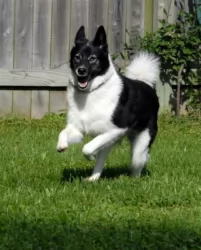 This is an intelligent dog breed, loving the time he spends with his human family but reluctant to be patted by strangers.
This is an intelligent dog breed, loving the time he spends with his human family but reluctant to be patted by strangers.
They also get along with pets that they have grown up with. They get on well with kids and make great watchdogs too. Small wonder they make such sought after pets and companions.
 Your Greek Shepherd is an intelligent, independent dog who likes to show his loyalty and devotion to his owner.
Your Greek Shepherd is an intelligent, independent dog who likes to show his loyalty and devotion to his owner.
He is a protective dog too and when trained and socialized makes an excellent family pet. These Molosser type dogs are formidable dogs known for their bravery and courage.
They're the type of dogs who like a strong leader-type of owner and when he gets someone who he can look up to as his leader, he becomes a loyal, devoted pet.
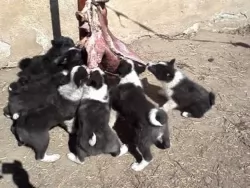 These Spitz type dogs are always known to enjoy good health, and owners don’t have to worry too much about their health as only a small number of health issues are reported with this healthy dog breed.
These Spitz type dogs are always known to enjoy good health, and owners don’t have to worry too much about their health as only a small number of health issues are reported with this healthy dog breed.
This is a congenital defect in the abdominal muscles and can result in fat or tissues being evident under the skin. A bulge is often seen in the area of the abdomen. Larger hernias will require surgery.
 With good care and lots of love, this dog can live to be between 10 to 12 years of age. He is unlikely to get sick very often, but still it it wise to know of some of the health issues than can occur with large breed dogs like this.
With good care and lots of love, this dog can live to be between 10 to 12 years of age. He is unlikely to get sick very often, but still it it wise to know of some of the health issues than can occur with large breed dogs like this.
This is a disease of the heart muscle. The heart is enlarged and unable to have the right heart rhythm. The distended muscle isn't able to push the blood through the heart chambers to where it is needed. Cause for this dilated heart can be genetic, nutritional, infectious or metabolic.
Because taurine and carnitine are involved in good heart function, and low levels of these amino acids can cause symptoms of dilated cardiomyopathy, supplementation is useful, especially if you feel your dog isn't getting in the right kind of food.
Borreliosis, a bacterial infection, causes Lyme disease, transmitted by the Ixodes tick. The tick bites the dog and the toxins gets into the dog's bloodstream, with the bacteria travelling to different parts of the body.
Typical symptoms in a dog includes loss of appetite, fever, no energy, swelling of joints and lameness, but symptoms can progress to kidney failure too or cardiac problems. Treatment will include antibiotics.
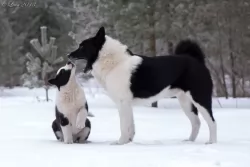 This is an energetic dog and will require a good amount of excerise. This dog isn’t suited to living in the city as they are highly active. Apart from wanting large grounds to run around in, he will need walks as well as ball- and rope games to keep him busy.
This is an energetic dog and will require a good amount of excerise. This dog isn’t suited to living in the city as they are highly active. Apart from wanting large grounds to run around in, he will need walks as well as ball- and rope games to keep him busy.
He is intelligent and needs some form of mental stimulation. There are good quality toys which one can buy for these dogs than can make them think.
Many things can change a dog’s longevity, and diet is one. A good nutritious diet with vitamins and minerals will give your dog less of a chance to get sick.
If you go for the best quality commercially manufactured dog foods, you’ll find that they are both convenient and well balanced.
To provide your dog with just a bit of variety in his diet, some home-made food added into the dry kibble from time to time will delight your pet.
No need to make preparing the food a huge issue either. Boil brown rice and chicken in a pot and add in sweet potatoes, carrots and spinach. Chop all this up and add small portions of it into the dry kibble.
Try to include a bit of raw meat occasionally and never let your dog be without a constant source of fresh, cool water
 The coat of the Greek Shepherd is fairly long so it will need to be brushed at least twice a week to keep it free from matting and tangling. He is an average shedder and the brushing will remove all loose hairs, keeping the coat sleek and shiny.
The coat of the Greek Shepherd is fairly long so it will need to be brushed at least twice a week to keep it free from matting and tangling. He is an average shedder and the brushing will remove all loose hairs, keeping the coat sleek and shiny.
Feeding your Greek Sheepdog requires giving him top quality food as this will ensure he is healthy and can ward off common dog illnesses. If you're going to be feeding him kibble, make sure to go for the top quality brands, and as a treat for your pet you can add in some brown rice, pasta, brown bread, cooked chicken and vegetables.
Dogs are essentially carnivores and he will need to have some raw meat such as beef added into his kibble from time to time. He should never ever be without a constant supply of fresh, cool water.